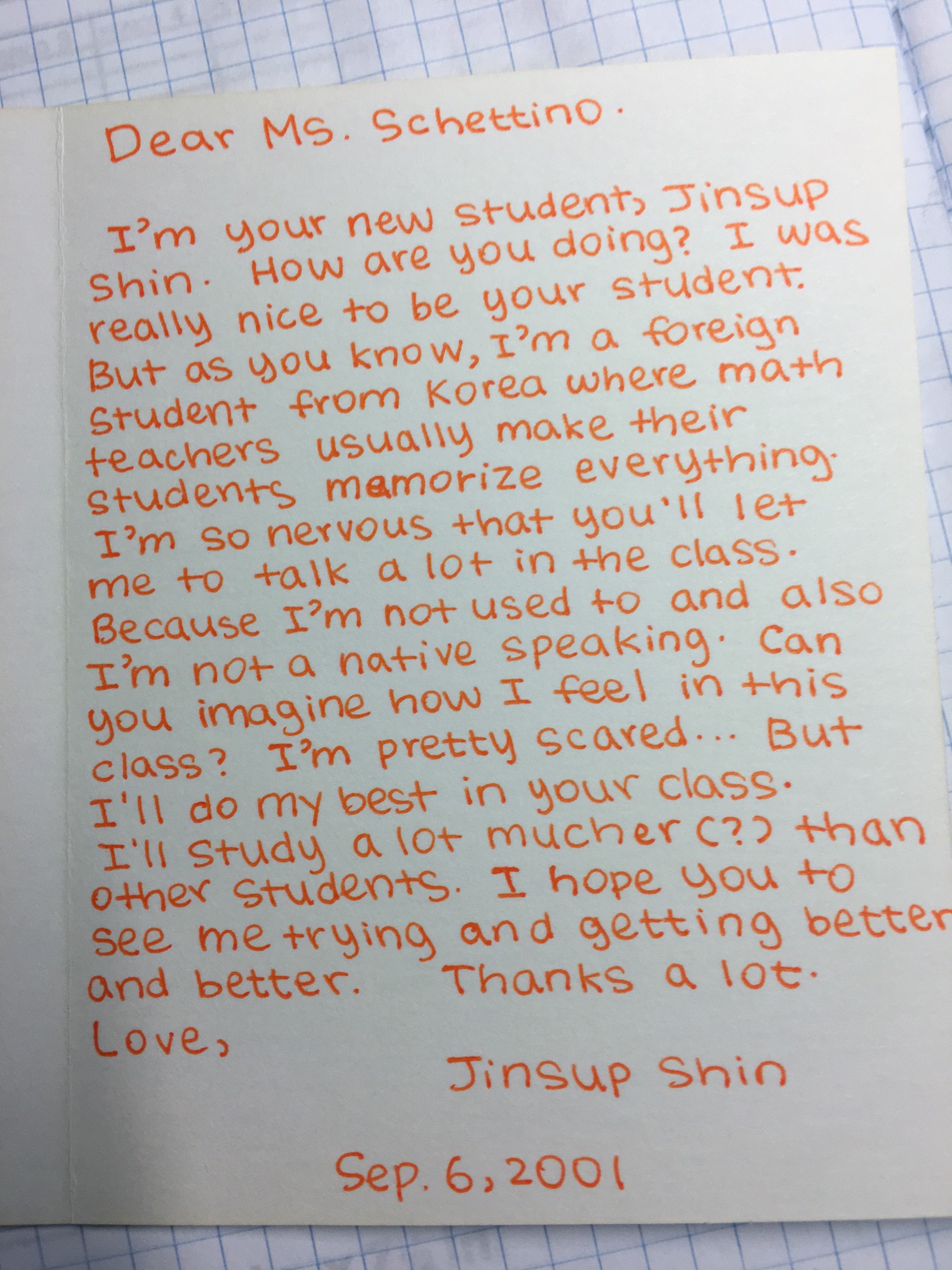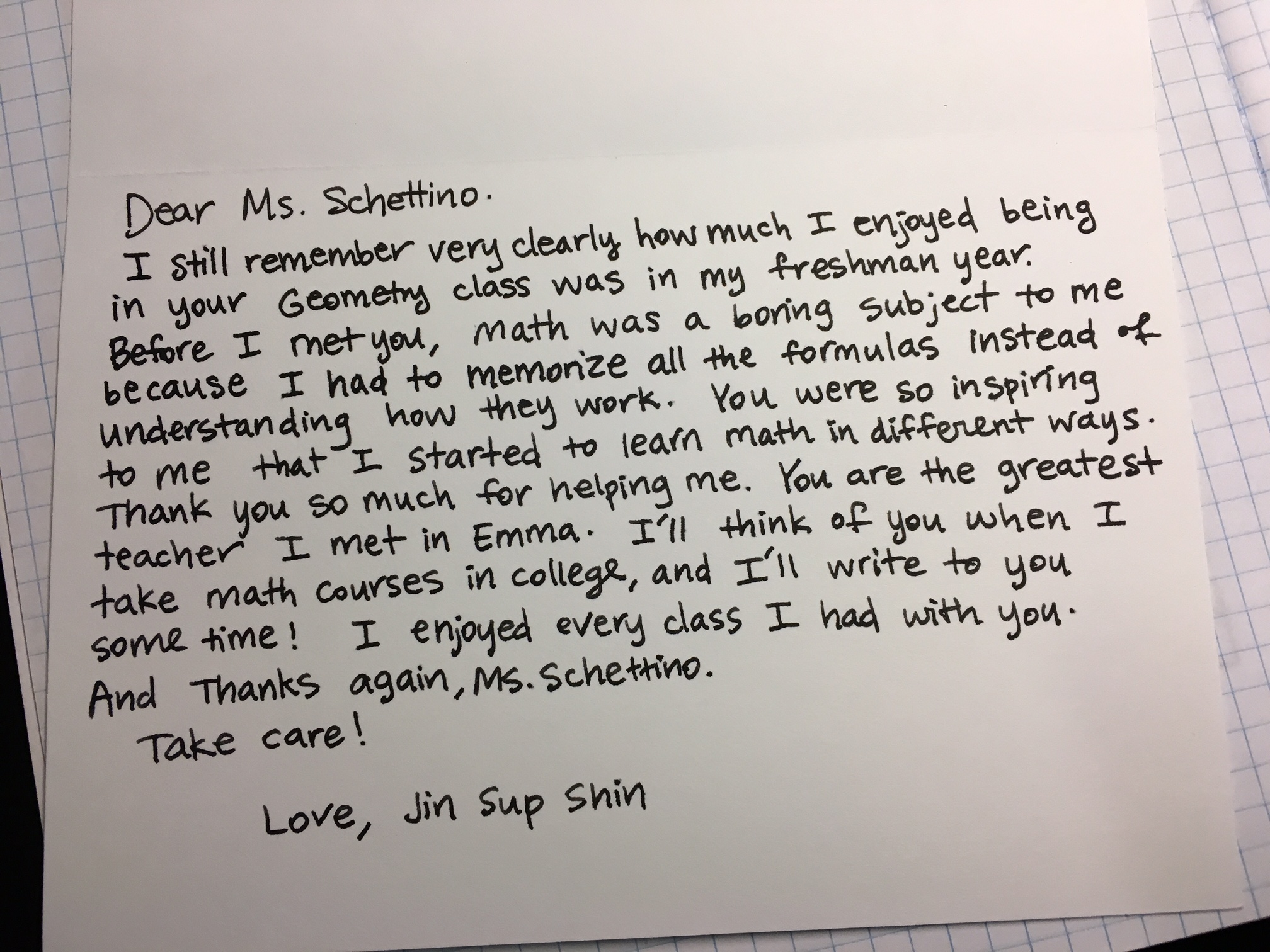As I am not going to be in the classroom next year, I have been going through some old boxes from my study and as many people who have been teaching for a long time have, I have boxes and bags full of cards from past students. I spent the afternoon one day going through these, reminiscing about so many great kids that I remember. One of them I had a card from the beginning of her freshman year and also one from the end of her senior year. Crazy!!
I don’t claim to be an expert in emergent English language learners and mathematics at all. I did have 10 years of teaching experience at a school (Emma Willard) where they had an ESL program and many students came into my mathematics classes who were not proficient in the English language. I do think those girls knew what they were getting themselves into and were up to the challenge, but some of them were very frightened.
Since she has now been out of college for a while, I would assume it’s ok for me to share this on my blog. Here is the card she gave me as a new student in 2001:

This card was written with the voice of a student who was used to a very structured, repetitive mathematics class and I believe she knew that coming into the U.S. things would be different, but possibly not as different as they were in my class. When she said, “I’m so nervous that you will let me to talk a lot in the class” I’m sure she was saying that she was nervous that I would expect her to contribute to the class discussion. What I did with many of those students, including Jinsup, was I focused in the beginning on letting them listen and write. I gave them lots of feedback on their journals and made sure they had the correct vocabulary and that their grammar in their writing made sense. I allowed them to ask more questions initially than to present their ideas until their confidence became stronger. Jinsup, as most Korean and Japanese students did, had excellent skills, as that was what their math education had focused on since elementary school. However, she was not very good at reasoning, sense-making or critical thinking on her own. It was almost as if she had not been asked to communicate about mathematics, as she was trying to say in her note to me.
However, she ended up doing very well in that first class and then I taught her again in precalculus (which we called Advanced Math) and then in BC Calculus her senior year. Her excellent background allowed her to focus on the reasoning aspects of all of these courses and in the end, I was very impressed with her growth. She really got the best of both worlds – the skills from her Asian mathematics education and the collaboration, communication and reasoning skills from the PBL here.
This is the note she wrote me at the end of her senior year:

Although I know this is only an anecdote and I don’t really have research evidence that PBL totally works with ELLs I do have confidence that with the right environment and patience, it is actually a great way of teaching for many of these second language learners. It allows them to find their voice in a language that is already new to them but at the same time have some practice in terminology that they may have heard before. I think this might be my next interesting research project – if anyone has some thoughts on this I’d love to hear them.
Hey Carmel! I have thought a lot about the connection between previously learned skills and success in a PBL environment. I once surveyed all of my students about midway through a completely Problem-Based Algebra 1 course using the Exeter materials about how they thought the course was going. There was an overwhelming positive response when it came to students’ perceptions about the effectiveness of the class, but many of them said that they believed that their previous experience learning in a more rote form gave them the background skills necessary to succeed in my class. I have never teased out the truth of it, but I can echo your experience with Jin Sup.
Hey Harry! Good to hear from you (and thanks for reading!). I would definitely agree that students who have had a strong background in skills tend to have an easier time focusing on the problem solving in PBL – that’s for sure. I think that’s one reason so many schools tend to choose to use this type of pedagogy only with their “honors” level classes. However, I have had a lot of experience teaching the “lower” ability kids at my school geometry (with a different set of problems) and they too, tend to really respond well. I think they sometimes feel like they have been for a while so they are less afraid of being wrong. However, students that have the stronger skills can definitely dive deeper and be much more self-regulated in their learning it seems. Just another argument for a strong background of certain skills from elementary school.